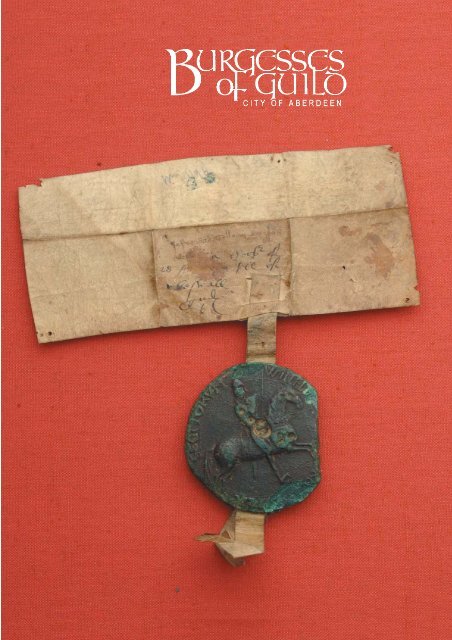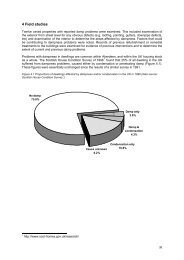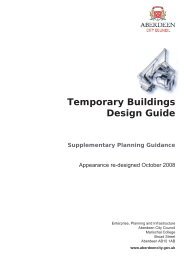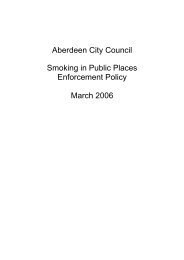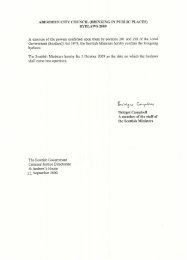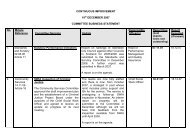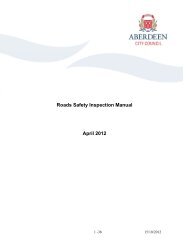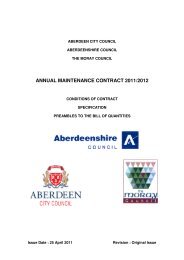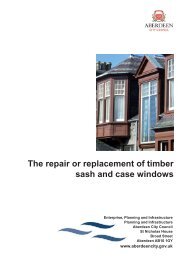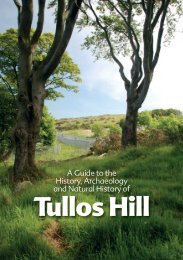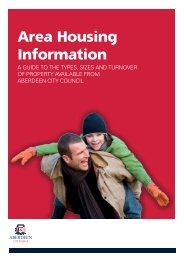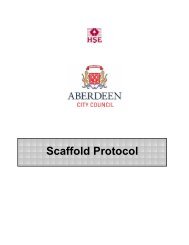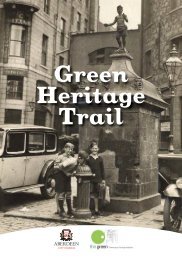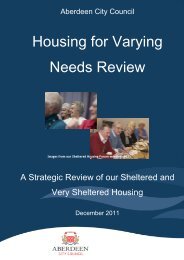he concept of the Burgess oath belongs - Aberdeen City Council
he concept of the Burgess oath belongs - Aberdeen City Council
he concept of the Burgess oath belongs - Aberdeen City Council
- No tags were found...
Create successful ePaper yourself
Turn your PDF publications into a flip-book with our unique Google optimized e-Paper software.
<strong>he</strong> <strong>concept</strong> <strong>of</strong> t<strong>he</strong> <strong>Burgess</strong> <strong>oath</strong> <strong>belongs</strong>to feudal times and is mentioned in T<strong>he</strong>Laws <strong>of</strong> t<strong>he</strong> Four Burghs, traditionallyascribed to King David I. An <strong>Aberdeen</strong> textwritten on t<strong>he</strong> original flyleaf <strong>of</strong> t<strong>he</strong><strong>Council</strong>’s Register for 1585-1589 may wellbe t<strong>he</strong> original medieval <strong>oath</strong>, and reads -I Salbe Leill and Trew to t<strong>he</strong> King <strong>of</strong> Scotland hisairis and successouris to t<strong>he</strong> burgh and fredome <strong>of</strong>abirdeneNevir Skayth ot<strong>he</strong>r Manis pr<strong>of</strong>feit for feeI sall obey to t<strong>he</strong> <strong>of</strong>ficiaris <strong>of</strong> this burgt to quhatestgait that ever I cumI sall voit, c<strong>he</strong>is nominat nor elect na persone norpersones to be provest nor baillie <strong>of</strong> this burgt botburgessis merchandis traffiquaris, and actualindwellaris <strong>of</strong> t<strong>he</strong> samynI shall giff leill and trew counsale and t<strong>he</strong> bestqu<strong>he</strong>n I am requyritI sall conceile t<strong>he</strong> counsale <strong>of</strong> this burgt warnethaime <strong>of</strong> thair skayt<strong>he</strong> and lat it at my powerI sall governe na unfre manis gudis under colour <strong>of</strong>my aininI sall scat, lott wac<strong>he</strong> walk and ward with t<strong>he</strong>inhabitants t<strong>he</strong>r<strong>of</strong>Na lordship to seikit in contrar t<strong>he</strong> liberte <strong>of</strong> thisburgtSwa <strong>he</strong>lp me god be my awin hand and all that godmaid.TranslationI will be true and faithful to t<strong>he</strong> King <strong>of</strong> Scotland,his <strong>he</strong>irs and successors, and to t<strong>he</strong> burgh andliberty <strong>of</strong> <strong>Aberdeen</strong>(I will) never injure anot<strong>he</strong>r man’s well being forpr<strong>of</strong>itI will obey t<strong>he</strong> <strong>of</strong>fice bearers <strong>of</strong> this burghwhatever position I reachI will not choose, nominate, vote for nor elect, anyindividual or individuals to be provost or baillie <strong>of</strong>this burgh except burgesses (who are) merchanttraders and actual residents <strong>of</strong> t<strong>he</strong> same burghI will give true and honest advice to t<strong>he</strong> best <strong>of</strong> myability w<strong>he</strong>n neededI will keep secret t<strong>he</strong> deliberations <strong>of</strong> this burgh(I will) forewarn t<strong>he</strong>m (sc. t<strong>he</strong> burgesses in council)<strong>of</strong> harm and prevent it if I canI will manage under pretence <strong>of</strong> ownership t<strong>he</strong>goods <strong>of</strong> no one (who is) not a burgessI will pay my due share <strong>of</strong> taxation and undertakewatch, patrol and guard duties in turn with t<strong>he</strong>inhabitants <strong>of</strong> t<strong>he</strong> burgh(I will) seek no patronage to t<strong>he</strong> injury <strong>of</strong> t<strong>he</strong>freedom <strong>of</strong> this burghSo <strong>he</strong>lp me God - by my own hand and by allGod’s creation
BURGESS OF GUILDABERDEEN1214This page: Castlegate with Tolbooth and Mercat CrossOpposite: Medieval Oath with TranslationCover: William t<strong>he</strong> Lion Charter 1201
Dean and Assessors with t<strong>he</strong> pre 1824 <strong>City</strong> Weights and MeasuresStanding: Alex Cocker, Dorothy Cryle, Joan Catto, James BarrackSeated:Colin Crosby, Dean <strong>of</strong> Guild Bill McKimmie, Senior Assessor Fred Dalgarno
erdeen can look back on a long andinteresting history, especially from1124 w<strong>he</strong>n, as a growing centre <strong>of</strong>trade and commerce, it became a Royalburgh and t<strong>he</strong>refore won special distinctionwith ot<strong>he</strong>r principal burghs in Scotland.Much <strong>of</strong> that history stems from t<strong>he</strong>actions <strong>of</strong> its early <strong>Burgess</strong>es, thoseresponsible citizens who, appointed asfreemen, were charged with guarding t<strong>he</strong>burgh’s laws and customs as well as t<strong>he</strong>burgh itself. T<strong>he</strong>ir loyalty to King andcommunity brought its own rewards byway <strong>of</strong> trading privileges as well as t<strong>he</strong>general esteem in which t<strong>he</strong>y were <strong>he</strong>ld.T<strong>he</strong> intention <strong>of</strong> this booklet is topresent a simple account <strong>of</strong> t<strong>he</strong> roleplayed by <strong>Burgess</strong>es down through t<strong>he</strong>years, a role that <strong>he</strong>lped lead t<strong>he</strong> burghto a more organised and, later,democratic system <strong>of</strong> local governmentw<strong>he</strong>reby in time a broad band <strong>of</strong> citizenscould claim t<strong>he</strong> right to vote or, indeed,to stand for t<strong>he</strong> local <strong>Council</strong>.Under a charter granted by KingAlexander II, who reigned from 1214 to1249, merchant <strong>Burgess</strong>es were givent<strong>he</strong> sole right to form a Guild, and thisbody exercised considerable power int<strong>he</strong> composition <strong>of</strong> t<strong>he</strong> local <strong>Council</strong>.That Guild, now no longer confined tomerchant members, remained an integralpart <strong>of</strong> t<strong>he</strong> <strong>Council</strong> for than 700 yearsand played a considerable role in t<strong>he</strong>growth and development <strong>of</strong> <strong>Aberdeen</strong>,but t<strong>he</strong> role <strong>of</strong> <strong>Burgess</strong>es <strong>of</strong> Guild todayis very different from that <strong>of</strong> t<strong>he</strong>irpredecessors.While it is essential we retain andnurture t<strong>he</strong> traditions <strong>of</strong> t<strong>he</strong> organisation,I feel that t<strong>he</strong> time has come for thatnew role to be more clearly defined sothat t<strong>he</strong> huge wealth <strong>of</strong> talent andexperience in our ranks can be put tobetter use in this modern era.It takes only a brief glance at t<strong>he</strong> longlist <strong>of</strong> names, pr<strong>of</strong>essions and businessesand t<strong>he</strong>refore interests, experience andexpertise within t<strong>he</strong> present membership<strong>of</strong> our Guildry to see t<strong>he</strong> potential insuch a body acting as ambassadors,collectively and individually, in takingevery opportunity to furt<strong>he</strong>r t<strong>he</strong>promotion <strong>of</strong> t<strong>he</strong> <strong>City</strong> <strong>of</strong> <strong>Aberdeen</strong>.Bill McKimmie, Dean <strong>of</strong> GuildApril 2002
Detail from Plan <strong>of</strong> <strong>Aberdeen</strong> 1661
ecognition <strong>of</strong> <strong>Burgess</strong>es as citizenswilling to accept publicresponsibilities goes back a longway. This is exemplified in t<strong>he</strong> earliestRoyal charters granting t<strong>he</strong>m exclusiveprivileges, in return, <strong>of</strong> course, fort<strong>he</strong>ir support, especially in financialterms.It was necessary, t<strong>he</strong>refore, that<strong>Burgess</strong>es possessed t<strong>he</strong> means, as wellas t<strong>he</strong> willingness, to meet t<strong>he</strong>seresponsibilities and be capable <strong>of</strong>guarding not only local laws andcustoms but also t<strong>he</strong> burgh itself.By definition, <strong>Burgess</strong>es were burghcitizens, involved in many aspects <strong>of</strong>business and trade, but not everyinhabitant became a <strong>Burgess</strong>. Employeeswere excluded, as were women, eventhose who ran t<strong>he</strong>ir own businesses.Fis<strong>he</strong>rmen, clergy and lawyers similarlyfound no place in t<strong>he</strong> ranks <strong>of</strong> t<strong>he</strong>medieval <strong>Burgess</strong>es, all <strong>of</strong> whom had topay a fine, an entry fee, to t<strong>he</strong> Town<strong>Council</strong> which went towards t<strong>he</strong>Common Good.A new <strong>Burgess</strong> took t<strong>he</strong> <strong>oath</strong> to respectand furt<strong>he</strong>r t<strong>he</strong> economic interests <strong>of</strong> t<strong>he</strong>burgh, to pay t<strong>he</strong> King’s taxes and todefend t<strong>he</strong> burgh against its enemies t<strong>he</strong> medieval formula <strong>of</strong> liability to payScot and lot, watch and ward. Each new<strong>Burgess</strong> had to present a weapon to t<strong>he</strong>burgh’s armoury and, as a mark <strong>of</strong>acceptance in t<strong>he</strong> community, had to payfor a feast for t<strong>he</strong> Provost and<strong>Council</strong>lors.So, it is easily seen how it was that onlycertain citizens were regarded as eligibleto be admitted as <strong>Burgess</strong>es.
We do not know who were t<strong>he</strong> first<strong>Burgess</strong>es in <strong>Aberdeen</strong> nor do we have afirm foundation date for t<strong>he</strong> burgh, butt<strong>he</strong>re are several pointers.T<strong>he</strong> earliest document in <strong>Aberdeen</strong> cityarchives, a charter <strong>of</strong> King William t<strong>he</strong>Lion from c.1180, claimed that t<strong>he</strong>privileges <strong>of</strong> those burghs north <strong>of</strong> t<strong>he</strong>Mounth - a recognised track crossing t<strong>he</strong>hills and leading to south markets - wereestablis<strong>he</strong>d by his grandfat<strong>he</strong>r, KingDavid, who died in 1153.King David had fought severalcampaigns against old establis<strong>he</strong>d Celticleaders to extend his Royal authoritythroughout Scotland and one <strong>of</strong> his actswas to confer on <strong>Aberdeen</strong> t<strong>he</strong> status <strong>of</strong>a Royal burgh which was also a means<strong>of</strong> ensuring more taxes being raisedfor his c<strong>of</strong>fers. It also allowed him, inturn, to confer trading privileges onthose who <strong>of</strong>fered t<strong>he</strong>ir loyalty.T<strong>he</strong> attraction <strong>of</strong> living and working in aRoyal burgh for anyone with drive andinitiative in t<strong>he</strong> 12th Century is simple tounderstand. Craftsmen and traders werefree men in relation to everyone exceptt<strong>he</strong>ir lord, t<strong>he</strong> King. T<strong>he</strong>y could callupon t<strong>he</strong> support <strong>of</strong> Royal <strong>of</strong>ficials toprotect t<strong>he</strong>m from any oppression bylesser lords, and t<strong>he</strong>y could be tried onlyin t<strong>he</strong> King’s court. T<strong>he</strong> downside, <strong>of</strong>course, was t<strong>he</strong> arbitrary nature <strong>of</strong> Royaltaxation.T<strong>he</strong> organisation <strong>of</strong> a burgh in thosedays was quite simple. An area withinrecognisable boundaries was designatedas t<strong>he</strong> burgh, within which a code <strong>of</strong>laws geared to t<strong>he</strong> needs <strong>of</strong>manufacturers and traders, as well as tot<strong>he</strong> maintenance <strong>of</strong> public order, hadauthority.Within t<strong>he</strong> burgh, a market place wasdesignated, streets laid out and buildingstances created on regular lines alongand between streets. In <strong>Aberdeen</strong>, t<strong>he</strong>Castlegate contained t<strong>he</strong> largest marketsquare in medieval Scotland. Weeklymarkets and annual fairs wereestablis<strong>he</strong>d and alongside t<strong>he</strong>m a burghcourt for t<strong>he</strong> speedy resolution <strong>of</strong>disputes between buyers and sellers.
While t<strong>he</strong> fairs attracted sellers andbuyers from a wide area, t<strong>he</strong> weeklymarket existed primarily for t<strong>he</strong> benefit<strong>of</strong> <strong>Burgess</strong>es. All goods had to bedisplayed for sale in open market onfixed days and at fixed hours so thateveryone had an equal chance to buy.Prices, too, were regulated, w<strong>he</strong>t<strong>he</strong>r <strong>of</strong>household consumables or <strong>of</strong> rawmaterials for industry. Breaking t<strong>he</strong> coderesulted in a fine.Those from outside t<strong>he</strong> burgh whobrought goods to t<strong>he</strong> market or whobought from it had to pay market tolls.T<strong>he</strong>se tolls and fines all went to swellt<strong>he</strong> Royal c<strong>of</strong>fers, as did t<strong>he</strong> customs ongoods imported and exported throught<strong>he</strong> harbour. T<strong>he</strong> King expectedtownsfolk to act as unpaid collectors andas baillies to run t<strong>he</strong> burgh and add tohis income.A number <strong>of</strong> charters given bysucceeding Kings show how <strong>Aberdeen</strong><strong>Burgess</strong>es benefited from t<strong>he</strong>ir patronageby t<strong>he</strong> granting <strong>of</strong> trading privileges andexemption from tolls and customs, notonly in t<strong>he</strong> burgh but throughoutScotland.Anot<strong>he</strong>r privilege granted by KingWilliam gave <strong>Burgess</strong>es freedom to actas a corporate body with powers to makeits own rules <strong>of</strong> local government, aprecursor to t<strong>he</strong> establishment <strong>of</strong> a Town<strong>Council</strong>.A later charter given by William’s son,King Alexander II, dated only Alyth 27February, conferred on <strong>Aberdeen</strong> rightsand privileges similar to thosepreviously granted by William t<strong>he</strong> Lionto Perth. T<strong>he</strong>se included control <strong>of</strong>wholesale trade in wool and skinsthroughout t<strong>he</strong> S<strong>he</strong>riffdom <strong>of</strong> <strong>Aberdeen</strong>and a grant to my <strong>Burgess</strong>es <strong>of</strong><strong>Aberdeen</strong>, except waulkers and weavers,that t<strong>he</strong>y have t<strong>he</strong>ir merchant guild.Thus, t<strong>he</strong> Guild was establis<strong>he</strong>d inemulation <strong>of</strong> t<strong>he</strong> King’s burgh <strong>of</strong> Perthand <strong>of</strong> every ot<strong>he</strong>r burgh withpretensions to overseas trade in cloth.T<strong>he</strong> surprising thing is that this is t<strong>he</strong>last mention <strong>of</strong> t<strong>he</strong> merchant guild <strong>of</strong><strong>Aberdeen</strong> - records <strong>of</strong> burghadministration beginning in t<strong>he</strong> 14thCentury refer simply to t<strong>he</strong> Guild orGuildry <strong>of</strong> <strong>Aberdeen</strong>.While craftsmen, even as <strong>Burgess</strong>es,were restricted to dealing in goods <strong>of</strong>t<strong>he</strong>ir own manufacture within Scotland,t<strong>he</strong>y could import raw materials fromabroad for t<strong>he</strong>ir own use.Merchant <strong>Burgess</strong>es, on t<strong>he</strong> ot<strong>he</strong>r hand,could buy goods from many sourcesthrough t<strong>he</strong> network <strong>of</strong> local markets,selling t<strong>he</strong>m at home and overseas andimporting manufactured goods andagricultural produce. This kind <strong>of</strong> trade,not based on manufacturing input, wast<strong>he</strong> jealously guarded prerogative <strong>of</strong> t<strong>he</strong>Guild brethren who paid significantlyhig<strong>he</strong>r entry fees to t<strong>he</strong> Town <strong>Council</strong>.Craftsmen could join t<strong>he</strong> Guild onlyafter forswearing t<strong>he</strong> practice <strong>of</strong> t<strong>he</strong>ircraft and by making up t<strong>he</strong> entry fee tot<strong>he</strong> hig<strong>he</strong>r rate.In t<strong>he</strong> early 15th Century w<strong>he</strong>n regularrecords began, every <strong>Burgess</strong> paid abasic fee, in real terms probably £100,
ut Guild members had to pay a furt<strong>he</strong>rsum greatly in excess <strong>of</strong> that. Sons andsons-in-law <strong>of</strong> <strong>Burgess</strong>es paid at t<strong>he</strong>lower end <strong>of</strong> t<strong>he</strong> scale, but newcomers tot<strong>he</strong> burgh had to pay handsomely for t<strong>he</strong>privileges t<strong>he</strong>y sought.Economic pressures were partlyresponsible for t<strong>he</strong> deterioration inrelationships between t<strong>he</strong> crafts and t<strong>he</strong>Guild in t<strong>he</strong> later Middle Ages. Robertt<strong>he</strong> Bruce encouraged t<strong>he</strong> development<strong>of</strong> his burghs to generate wealth and tohasten t<strong>he</strong> economic recovery <strong>of</strong>Scotland in t<strong>he</strong> aftermath <strong>of</strong> t<strong>he</strong> first War<strong>of</strong> Independence.In 1357 t<strong>he</strong> need to pay t<strong>he</strong> English for aKing’s ransom and to conclude t<strong>he</strong>second War <strong>of</strong> Independence seriouslyinhibited economic development <strong>of</strong> t<strong>he</strong>kingdom.To raise this ransom, £20 million attoday’s prices, foreign trade needed to beencouraged by all possible means, andt<strong>he</strong> merchants were favoured as a classover t<strong>he</strong>ir competitors - foreignmerchants and native craftsmen.A general charter <strong>of</strong> privilege to t<strong>he</strong><strong>Burgess</strong>es <strong>of</strong> all Scottish burghs, issuedin 1364, effectively reinforced<strong>Aberdeen</strong>’s control <strong>of</strong> exports from<strong>Aberdeen</strong>shire and, by restrictingcommerce to t<strong>he</strong> merchant class,undercut t<strong>he</strong> position <strong>of</strong> craftsmen<strong>Burgess</strong>es.Thus w<strong>he</strong>n t<strong>he</strong> pages <strong>of</strong> t<strong>he</strong> <strong>Aberdeen</strong><strong>Council</strong> Register first opened to view in1398, t<strong>he</strong> merchants and Guild brethrenwere well on t<strong>he</strong>ir way to dominatingMonumet to commemorate t<strong>he</strong> Battle <strong>of</strong> Harlawt<strong>he</strong> burgh. But soon after came t<strong>he</strong> Battle<strong>of</strong> Harlaw, one which gave all <strong>of</strong><strong>Aberdeen</strong>’s <strong>Burgess</strong>es a walk-on part int<strong>he</strong> pageant <strong>of</strong> Scottish literature andhistory, for it was as a united body thatt<strong>he</strong>y joined t<strong>he</strong> force raised from t<strong>he</strong>burgh by Provost Davidson to face t<strong>he</strong>Lord <strong>of</strong> t<strong>he</strong> Isles and his invadingHighland army at that historic encounternear Inverurie.
As t<strong>he</strong> years <strong>of</strong> t<strong>he</strong> Middle Agesunrolled so <strong>Aberdeen</strong>’s <strong>Burgess</strong>escontinued to enjoy t<strong>he</strong>ir tradingprivileges. As in ot<strong>he</strong>r large Scottishburghs, so in <strong>Aberdeen</strong> no one couldtrade in goods not <strong>of</strong> his ownmanufacture unless <strong>he</strong> was a <strong>Burgess</strong> <strong>of</strong>Guild. Trade <strong>Burgess</strong>es, however, couldmanufacture and sell t<strong>he</strong>ir products, butlittle more.As each new <strong>Burgess</strong>, <strong>of</strong> Guild or Trade,was admitted to t<strong>he</strong> privileges <strong>of</strong> hisorder <strong>he</strong> had to pay to t<strong>he</strong> Town <strong>Council</strong>a sum called his composition.T<strong>he</strong>se were t<strong>he</strong>n allocated by t<strong>he</strong> Town<strong>Council</strong> to various accounts kept in t<strong>he</strong>irbooks. To our modern eyes t<strong>he</strong>y bearunusually colourful titles such asCasualties, Arms’ Money, Guild Wine,Guild Box and Additional Fund to GuildBox.Arms’ Money replaced t<strong>he</strong> weapon in t<strong>he</strong>hand <strong>of</strong> t<strong>he</strong> entrant <strong>Burgess</strong>, Guild Winewas in place <strong>of</strong> t<strong>he</strong> payment for t<strong>he</strong>medieval feast, and t<strong>he</strong> Guild Box wasset up in 1600 to collect small paymentsfor t<strong>he</strong> relief <strong>of</strong> poverty among Guildbrethren. T<strong>he</strong> box was banded with irnehavend four lockis and four keyis <strong>he</strong>ldby t<strong>he</strong> Dean <strong>of</strong> Guild, t<strong>he</strong> <strong>City</strong> Treasurerand two merchants.Income and expenditure fluctuated overt<strong>he</strong> years, but in 1710 t<strong>he</strong> Dean <strong>of</strong> Guildwas in a position to invest £19,000 Scotsfrom t<strong>he</strong> Guild Wine Fund in a halfshare in t<strong>he</strong> first half <strong>of</strong> t<strong>he</strong> Lands <strong>of</strong>Skene, out <strong>of</strong> which t<strong>he</strong> Lands <strong>of</strong> Cairnieremain, <strong>he</strong>ld today for t<strong>he</strong> Guildrycharitable funds, t<strong>he</strong> BridgeworksAccount and t<strong>he</strong> Common Good.T<strong>he</strong> <strong>Burgess</strong> <strong>oath</strong> underwent severalmodifications. One clause belatedlyinserted by t<strong>he</strong> Town <strong>Council</strong> in 1678sought to impose a severe restriction onnon-Protestants. Such was t<strong>he</strong> outcryagainst it that an order was obtainedfrom t<strong>he</strong> Privy <strong>Council</strong> in Whitehall in1714 to rescind it.In 1819 t<strong>he</strong> Convention <strong>of</strong> Royal Burghsvoted to abolish t<strong>he</strong> <strong>oath</strong>, replacing itwith an undertaking by <strong>Burgess</strong>es todischarge every civil incumbent duty bylaw, t<strong>he</strong> wording which remains on t<strong>he</strong><strong>Burgess</strong> ticket to this day.<strong>Burgess</strong> Oath before 1714
Although it was agreed that t<strong>he</strong>Guildry’s charitable funds beadministered by t<strong>he</strong> Town <strong>Council</strong> solelyfor t<strong>he</strong> benefit <strong>of</strong> impoveris<strong>he</strong>d Guildbrethren, t<strong>he</strong>ir widows, orphans andunmarried daughters, control <strong>of</strong> t<strong>he</strong>sefunds has lain with successive localauthorities.On a number <strong>of</strong> occasions in t<strong>he</strong> mid19th Century members <strong>of</strong> t<strong>he</strong> Guildryfound t<strong>he</strong>ir claim to ownership <strong>of</strong>Guildry funds angrily rebuffed by t<strong>he</strong>Town <strong>Council</strong>, all <strong>of</strong> whose memberswere, <strong>of</strong> course, members <strong>of</strong> t<strong>he</strong> Guild.Possession being said to be nine-tenths<strong>of</strong> t<strong>he</strong> law, and t<strong>he</strong> Guildry being anunincorporated body, t<strong>he</strong> <strong>Council</strong> wereable to persuade t<strong>he</strong> Court <strong>of</strong> Session <strong>of</strong>t<strong>he</strong>ir rights to t<strong>he</strong> funds labelled asGuildry funds.T<strong>he</strong>re had been earlier conflicts betweenGuild and <strong>Council</strong>. In 1782 and again in1817 <strong>Burgess</strong>es were involved in localagitation for political change, but it wasonly after t<strong>he</strong> reform <strong>of</strong> Parliament in1832 that t<strong>he</strong> Royal Burghs Reform Act<strong>of</strong> 1833 began t<strong>he</strong> slow democratisation<strong>of</strong> local government.<strong>Aberdeen</strong>, still within its ancientboundaries, was made up <strong>of</strong> three wardsand councillors were elected by t<strong>he</strong>votes <strong>of</strong> all qualified electors withineach ward, men who were owners ortenants <strong>of</strong> property with an annual rental<strong>of</strong> at least £10.This was, <strong>of</strong> course, a long way short <strong>of</strong>t<strong>he</strong> democratic process we have come toknow, especially w<strong>he</strong>n we bear in mindthat until 1871 votes were not secret butrecorded by t<strong>he</strong> Town Clerk’s staff invoting registers still preserved in cityarchives.With introduction <strong>of</strong> t<strong>he</strong> Police Act <strong>of</strong>1871 t<strong>he</strong> role <strong>of</strong> <strong>Burgess</strong>es was changedcompletely. No longer could t<strong>he</strong>y belooked upon as guardians <strong>of</strong> t<strong>he</strong> burgh,and with removal <strong>of</strong> trading privilegest<strong>he</strong>ir position no longer <strong>he</strong>ld t<strong>he</strong>relevance <strong>of</strong> earlier days.T<strong>he</strong>ir numbers t<strong>he</strong>n also went intodecline and, with a considerablereduction in t<strong>he</strong> role <strong>of</strong> t<strong>he</strong>ir Dean,interest in t<strong>he</strong> <strong>Burgess</strong> movementflagged over t<strong>he</strong> years, so much so thatextinction looked possible.Membership <strong>of</strong> t<strong>he</strong> Guildry has variedwidely over t<strong>he</strong> years. As t<strong>he</strong> privilegesand rights <strong>of</strong> <strong>Burgess</strong>es declined, andwith less need for t<strong>he</strong>ir presence tosafeguard laws and customs <strong>of</strong> t<strong>he</strong>burgh, t<strong>he</strong>ir numbers decreased.At t<strong>he</strong> start <strong>of</strong> t<strong>he</strong> 19th Century, w<strong>he</strong>n<strong>Aberdeen</strong> had a population <strong>of</strong> about40,000, t<strong>he</strong>re were about 1,000<strong>Burgess</strong>es. In 1817, t<strong>he</strong>re were 820. By1867 t<strong>he</strong> number was down to 337 and acentury later t<strong>he</strong> number was much t<strong>he</strong>same, dropping to 300 in 1981 - and stillall men. But all that was soon to change,just as t<strong>he</strong> city had changed with t<strong>he</strong>discovery <strong>of</strong> oil under t<strong>he</strong> North Sea.
s t<strong>he</strong> city’s population swelled to morethan 200,000 so, too, did membership<strong>of</strong> t<strong>he</strong> Guildry, reaching about 850in t<strong>he</strong> year 2000. But it was in 1983 that,by a major change in t<strong>he</strong> rules <strong>of</strong>admission, women were admitted as full<strong>Burgess</strong>es and, at an historic Town<strong>Council</strong> meeting on November 28 <strong>of</strong> thatyear, seven women received t<strong>he</strong>ircertificates <strong>of</strong> admission.Subsequently, one went on to be electeda member <strong>of</strong> t<strong>he</strong> team <strong>of</strong> six Assessorswho support t<strong>he</strong> Dean <strong>of</strong> Guild inrunning all areas <strong>of</strong> t<strong>he</strong> organisation.Membership was not t<strong>he</strong> only area thatwas regarded as in need <strong>of</strong> change. In1981, t<strong>he</strong> t<strong>he</strong>n Dean <strong>of</strong> Guild raised hisconcern that Guildry funds were notbeing used to t<strong>he</strong> benefit <strong>of</strong> t<strong>he</strong>community. Informal talks were <strong>he</strong>ldwith t<strong>he</strong> Town Clerk on ways in whichfunds, surplus after paying all annuities,might be used, but it was felt thatnothing could be done.
BURGESS OF GUILDABERDEEN1214Left to right:Mrs Lilian Step<strong>he</strong>nMrs Freda MutchDiane MorganMrs Dorothy GrassieMrs Anne G CockerMiss Marjorie BosomworthMrs Elizabeth BlacklawSome nine years later, followingagreement among all <strong>Burgess</strong>es and witht<strong>he</strong> <strong>Council</strong>, a petition was submitted tot<strong>he</strong> Court <strong>of</strong> Session in Edinburgh toallow a variation in t<strong>he</strong> use <strong>of</strong> surplusfunds. After much legal argument, andt<strong>he</strong> proviso that t<strong>he</strong> payment <strong>of</strong> annuitiesremained as t<strong>he</strong> first obligation, thispetition was finally granted in 1996.Under it, t<strong>he</strong> Guild won t<strong>he</strong> right to givefinancial support to selected citizens ineducational or vocational training orot<strong>he</strong>rwise to furt<strong>he</strong>r proposed careers.Subsequently came introduction <strong>of</strong> t<strong>he</strong>Guildry Award Sc<strong>he</strong>me.Guidelines for t<strong>he</strong> award state thatsupport will be considered to assistpersons born or habitually resident int<strong>he</strong> <strong>City</strong> <strong>of</strong> <strong>Aberdeen</strong> and intending topursue careers that, if pursued, wouldqualify t<strong>he</strong>m for admission as <strong>Burgess</strong>es<strong>of</strong> Guild <strong>of</strong> <strong>Aberdeen</strong>, to pursue educationor vocational training courses or ot<strong>he</strong>rwiseto furt<strong>he</strong>r t<strong>he</strong>ir proposed careers.
<strong>he</strong> first such award was made in2001 to Mrs Pauline Gerrard,enabling <strong>he</strong>r to attend a course <strong>of</strong>neuro-developmental delay studies.T<strong>he</strong>se involved training in techniquesdesigned to <strong>he</strong>lp young childrenovercome learning and behaviouraldifficulties, techniques which MrsGerrard hoped to introduce for t<strong>he</strong>benefit <strong>of</strong> children in t<strong>he</strong> <strong>Aberdeen</strong> area.Anot<strong>he</strong>r significant change in Guildactivities in keeping with modern timessaw t<strong>he</strong> introduction <strong>of</strong> a series <strong>of</strong> socialevents, with visits to places <strong>of</strong> interest int<strong>he</strong> area, a special evening to support t<strong>he</strong>city’s annual International YouthFestival, a film show that captured somelocal historic occasions, andopportunities afterwards for <strong>Burgess</strong>eswith t<strong>he</strong>ir guests to make new friendsand renew acquaintances.One event that <strong>he</strong>lped to highlightMillennium Year for t<strong>he</strong> Guild and tostrengt<strong>he</strong>n a historic connection was avisit to Trinity Hall, home <strong>of</strong> t<strong>he</strong> SevenIncorporated Trades <strong>of</strong> <strong>Aberdeen</strong> whosemembers also share an important placein t<strong>he</strong> annals <strong>of</strong> t<strong>he</strong> city.For t<strong>he</strong> <strong>Burgess</strong>es <strong>of</strong> Guild t<strong>he</strong>mselves,t<strong>he</strong> second Tuesday <strong>of</strong> May each yearholds special significance. That is t<strong>he</strong>traditional date set for t<strong>he</strong>ir AnnualGeneral Meeting, with an equallytraditional start time - 12 noon.Presentation <strong>of</strong> First Guildry AwardLeft to right: Bill McKimmie, Dean <strong>of</strong> Guild, <strong>Council</strong>lorDavid E. Clyne, Master <strong>of</strong> Mortifications, Pauline Gerrard,Alan T. Towns, Assistant to t<strong>he</strong> Chief Executive, <strong>Aberdeen</strong><strong>City</strong> <strong>Council</strong>, Bill Wyllie, Dean <strong>of</strong> Guild 1981 to 1998.
Royal authority for t<strong>he</strong> formation <strong>of</strong> an<strong>Aberdeen</strong> Guild <strong>of</strong> <strong>Burgess</strong>es did morethan that - it also hastened a serioussplit within t<strong>he</strong> ranks <strong>of</strong> t<strong>he</strong> <strong>Burgess</strong>est<strong>he</strong>mselves.W<strong>he</strong>n King Alexander II decreed thatthis new Guild be formed, <strong>he</strong> laid itdown that it be open only to those<strong>Burgess</strong>es who were merchants. Ot<strong>he</strong>rs,t<strong>he</strong> manufactures, traders and craftsmen- waulkers and weavers in t<strong>he</strong> King’swords - were to be excluded.And so arose a serious conflict betweenmerchant and trade <strong>Burgess</strong>es that wasto continue for centuries not only in<strong>Aberdeen</strong> but throughout Scottish burghs.Following t<strong>he</strong>ir exclusion from t<strong>he</strong> newGuild, t<strong>he</strong> <strong>Aberdeen</strong> traders turned moretowards t<strong>he</strong>ir own trade associations, t<strong>he</strong>Weavers, t<strong>he</strong> Hammermen, Wrights andCoopers, Bakers and t<strong>he</strong> like. Later, int<strong>he</strong> 16th Century t<strong>he</strong>y decided to joinforces in a corporate body, t<strong>he</strong>Incorporated Trades <strong>of</strong> <strong>Aberdeen</strong>, to <strong>he</strong>lpprotect t<strong>he</strong>ir position, t<strong>he</strong>ir rights andprivileges and to promote t<strong>he</strong>ir standingwithin t<strong>he</strong> burgh.This also led to t<strong>he</strong> setting up <strong>of</strong> t<strong>he</strong>irown hospital and meeting rooms under agroup <strong>of</strong> corporate <strong>of</strong>ficials, t<strong>he</strong> principalbeing t<strong>he</strong> Deacon Convener whopresided over his court <strong>of</strong> craft deacons.And so began a separate chapter <strong>of</strong><strong>Aberdeen</strong>’s history.T<strong>he</strong>se <strong>Burgess</strong>es, who became known as<strong>Burgess</strong>es <strong>of</strong> Trade, remained on t<strong>he</strong>burgh’s <strong>Burgess</strong> list with all attendantresponsibilities but without a number <strong>of</strong>privileges accorded t<strong>he</strong> merchantmembers. At one time t<strong>he</strong>y were alsorefused entry into t<strong>he</strong> new Guild unlessprepared to renounce t<strong>he</strong>ir own craft.This kind <strong>of</strong> exclusion strengt<strong>he</strong>ned t<strong>he</strong>power base <strong>of</strong> Guild members whoseinfluence upon t<strong>he</strong> composition andconduct <strong>of</strong> t<strong>he</strong> Town <strong>Council</strong> wasconsiderable and even led to furt<strong>he</strong>rreductions in trading privileges grantedto t<strong>he</strong> traders.Despite t<strong>he</strong>se difficulties between Guildand Trade <strong>Burgess</strong>es, obligations andduties remained t<strong>he</strong> same for allregarding t<strong>he</strong> need for personalresidence within t<strong>he</strong> burgh, Scot and lot,watch and ward, and t<strong>he</strong> provision <strong>of</strong>weapons for local defence.T<strong>he</strong> <strong>oath</strong> taken by both categories alsoremained largely t<strong>he</strong> same and this unitywas exemplified by t<strong>he</strong> willingness <strong>of</strong> all<strong>Burgess</strong>es to join t<strong>he</strong> force raised in1411 by Provost Robert Davidson to<strong>he</strong>lp halt t<strong>he</strong> southwards advance <strong>of</strong>Donald Ross, Lord <strong>of</strong> t<strong>he</strong> Isles, as hisHighland attackers advanced on <strong>Aberdeen</strong>.Confrontation between t<strong>he</strong> armies cameat Harlaw, near Inverurie, w<strong>he</strong>re t<strong>he</strong>Highland invaders were beaten, but onlyafter considerable loss <strong>of</strong> life on bothsides, one such casualty being ProvostDavidson who was seen as something <strong>of</strong>a <strong>he</strong>ro and was buried in t<strong>he</strong> burgh’s StNicholas kirkyard.St Nicholas Church oak steeple burned down in 1874 .
In 1364 a general charter granting newprivileges throughout Scotland had t<strong>he</strong>effect <strong>of</strong> reinforcing <strong>Aberdeen</strong>’s control<strong>of</strong> exports from <strong>Aberdeen</strong>shire and inrestricting involvement in suchcommerce to t<strong>he</strong> merchants.T<strong>he</strong> Trade <strong>Burgess</strong>es were dealt a furt<strong>he</strong>rblow in 1469 with t<strong>he</strong> introduction <strong>of</strong> anew Act described as t<strong>he</strong> most damningAct <strong>of</strong> t<strong>he</strong> Scottish Parliament whichmade burgh councils self-electing,effectively denying t<strong>he</strong> Trade <strong>Burgess</strong>esany worthwhile say in local affairs.This conflict between <strong>Burgess</strong>es was notconfined to <strong>Aberdeen</strong>. A joint appealfrom trade members in Edinburgh, Perth,Dundee and <strong>Aberdeen</strong> obtained fromKing James VI in 1581 a new charterconfirming old privileges and anextension <strong>of</strong> t<strong>he</strong>ir trading rights.However, <strong>Aberdeen</strong> magistrates andcouncil extorted promises fromprominent traders not to exercise t<strong>he</strong>seprivileges, and, in turn, t<strong>he</strong> traders t<strong>he</strong>nrefused to proceed with t<strong>he</strong>ir part in t<strong>he</strong>election <strong>of</strong> council <strong>of</strong>fice-bearers untilt<strong>he</strong>ir rights were restored.In 1587, with both sides possibly tiring<strong>of</strong> reprisals, t<strong>he</strong>ir differences went toarbitration and a decree was issuedregulating t<strong>he</strong> dealings <strong>of</strong> t<strong>he</strong> Town<strong>Council</strong> with t<strong>he</strong> traders.Besides defining t<strong>he</strong> respective liberties<strong>of</strong> trading for both sides, t<strong>he</strong> decree - t<strong>he</strong>Common Indenture - also fixed entrycharges for new <strong>Burgess</strong>es. But t<strong>he</strong>agreement did not produce t<strong>he</strong> expectedharmony and differences mounted to t<strong>he</strong>point w<strong>he</strong>re, in 1592, an open-airmeeting at Greyfriars became a violentconfrontation at which blood was spilt.This had t<strong>he</strong> effect, however, <strong>of</strong> bringingboth sides to t<strong>he</strong>ir senses and a few dayslater, at a more solemn meeting atWoolmanhill, t<strong>he</strong> parties werereconciled.Gradually, over t<strong>he</strong> years, as t<strong>he</strong> practice<strong>of</strong> granting rights and privileges to<strong>Burgess</strong>es lessened considerably, so toodid division between <strong>Burgess</strong>es <strong>of</strong> Guildand <strong>of</strong> Trade. A new equality began toemerge, first from decisions by t<strong>he</strong>Convention <strong>of</strong> Royal Burghs and laterby t<strong>he</strong> Reform Act <strong>of</strong> 1833 which alsoput council elections on a new footing.Now, with those years <strong>of</strong> division left farbehind, Guild and Trade are united onceagain as <strong>Burgess</strong>es supporting t<strong>he</strong>wellbeing <strong>of</strong> t<strong>he</strong> <strong>City</strong> <strong>of</strong> <strong>Aberdeen</strong>.Early 19th Century advert to sell goods in <strong>Aberdeen</strong>Petition from Town’s tradesmen to t<strong>he</strong> Dean <strong>of</strong>Guild to stop sale
T<strong>he</strong> Dean in full regaliamaintains a ceremonialtraditionT<strong>he</strong> title Dean <strong>of</strong> Guild, denoting t<strong>he</strong>senior <strong>of</strong>ficial representing t<strong>he</strong> Guild, orGuildry <strong>of</strong> <strong>Burgess</strong>es, came into beingonly in 1427, centuries after <strong>Burgess</strong>eshad been instituted as a collective groupcharged with upholding t<strong>he</strong> laws andcustoms <strong>of</strong> t<strong>he</strong> burgh.In t<strong>he</strong> earlier days <strong>Burgess</strong>es were<strong>he</strong>aded by t<strong>he</strong> burgh Alderman, whoseposition was later that <strong>of</strong> Provost, and itwas <strong>he</strong> who took charge <strong>of</strong> t<strong>he</strong> Guildw<strong>he</strong>n it came into being about 1222.From 1427 until 1833 t<strong>he</strong> Dean’sposition was that <strong>of</strong> an <strong>of</strong>ficial <strong>of</strong> t<strong>he</strong>Town <strong>Council</strong> and <strong>he</strong> was appointed assuch but, with t<strong>he</strong> introduction inScottish burghs <strong>of</strong> t<strong>he</strong> Reform Act in1833, Deans <strong>of</strong> Guild were madeconstituent members <strong>of</strong> t<strong>he</strong>ir Town<strong>Council</strong>s, appointed by t<strong>he</strong>ir Guilds andnot by electoral vote.In t<strong>he</strong> early days t<strong>he</strong> Dean would havebeen very much t<strong>he</strong> town’s man,enforcing burgh regulations relating totrade and responsible for t<strong>he</strong> upkeep <strong>of</strong>council property. His name, it wasclaimed, became a terror to evil-doers.If any attempt was made to encroach ont<strong>he</strong> liberties <strong>of</strong> t<strong>he</strong> burgh, t<strong>he</strong> Deanwould have been instructed to put a stopto t<strong>he</strong> proceedings.Towards t<strong>he</strong> end <strong>of</strong> t<strong>he</strong> 16th Century,some Norwegian ships arrived atNewburgh, a few miles north <strong>of</strong><strong>Aberdeen</strong>, and began to unload. ButNewburgh was not a free port as far asforeign trade was concerned and wasunder <strong>Aberdeen</strong> jurisdiction. T<strong>he</strong> act <strong>of</strong>unloading at t<strong>he</strong> little port at t<strong>he</strong> mouth<strong>of</strong> t<strong>he</strong> Ythan was, t<strong>he</strong>refore, aninfringement <strong>of</strong> <strong>Aberdeen</strong>’s rights, so t<strong>he</strong>Dean <strong>of</strong> t<strong>he</strong> day was dispatc<strong>he</strong>d with anarmed <strong>of</strong>ficer and men to arrest t<strong>he</strong>ships and take t<strong>he</strong>ir sails from t<strong>he</strong>masts.Part <strong>of</strong> t<strong>he</strong> Dean’s duties also includedsupervision <strong>of</strong> t<strong>he</strong> loading <strong>of</strong> shipsbound for foreign ports to ensure thatt<strong>he</strong>ir bills <strong>of</strong> lading were in order. It waslaw t<strong>he</strong>n that a ship without a proper bill<strong>of</strong> lading was a pirate and could beattacked without redress.
In 1597, t<strong>he</strong> Dean was required tosupervise t<strong>he</strong> burning <strong>of</strong> a number <strong>of</strong>witc<strong>he</strong>s as well as t<strong>he</strong> execution <strong>of</strong> fourpirates. In t<strong>he</strong> same year <strong>he</strong> had tooversee t<strong>he</strong> rebuilding <strong>of</strong> part <strong>of</strong> t<strong>he</strong>Town House and was paid a specialallowance for carrying out t<strong>he</strong>se tasks.Above all, it was t<strong>he</strong> duty <strong>of</strong> t<strong>he</strong> Dean tocarry out t<strong>he</strong> instructions <strong>of</strong> t<strong>he</strong>magistrates and <strong>Council</strong>.It was about this time that t<strong>he</strong> Dean <strong>of</strong>Guild was empowered by statute toexercise t<strong>he</strong> authority <strong>of</strong> a judge indisputes between merchants and alsobetween merchants and mariners. Witht<strong>he</strong> assistance <strong>of</strong> his Assessors,appointed by a Town <strong>Council</strong> somewhatjealous <strong>of</strong> this extension to t<strong>he</strong> Dean’spower and authority, <strong>he</strong> could decide insuch cases in a summary manner.However, <strong>he</strong> never possessed t<strong>he</strong> power<strong>of</strong> judging any case with regard toproperty within t<strong>he</strong> burgh, and t<strong>he</strong>re wasnever a Dean <strong>of</strong> Guild Court, ascommonly understood in Scotland, in<strong>Aberdeen</strong>.T<strong>he</strong> charter granted by Charles I to t<strong>he</strong>burgh in 1638 specifically mentioned t<strong>he</strong>responsibility <strong>of</strong> t<strong>he</strong> Dean <strong>of</strong> Guild formaintaining t<strong>he</strong> standard weights andmeasures - a service absolutely vital tot<strong>he</strong> population. An inspector <strong>of</strong> weightsand measures, a paid <strong>of</strong>ficer <strong>of</strong> t<strong>he</strong> Town<strong>Council</strong>, was appointed for this task int<strong>he</strong> 19th Century.T<strong>he</strong> Dean’s duties down t<strong>he</strong> years wereindeed varied. In 1774, for example, <strong>he</strong>was responsible for estimating t<strong>he</strong> cost<strong>of</strong> keeping t<strong>he</strong> streets in repair andlighting, toget<strong>he</strong>r with t<strong>he</strong> cost <strong>of</strong>supplying water to t<strong>he</strong> burgh - and all atan assessment <strong>of</strong> one shilling in t<strong>he</strong>pound <strong>of</strong> house rents.Dean <strong>of</strong> Guild Accounts for burning witc<strong>he</strong>s 1597T<strong>he</strong> Royal Burghs Reform Act <strong>of</strong> 1833brought a number <strong>of</strong> changes involvingt<strong>he</strong> Dean. Under it <strong>he</strong> was elected by his<strong>Burgess</strong>es <strong>of</strong> Guild as t<strong>he</strong> nineteenthmember <strong>of</strong> t<strong>he</strong> Town <strong>Council</strong> to sit ast<strong>he</strong>ir representative. Over t<strong>he</strong> nextcentury several Deans <strong>of</strong> Guild went onto serve as Provost, demonstrating thatt<strong>he</strong> Dean’s position remained asignificant one in local politics.Ot<strong>he</strong>r outcomes <strong>of</strong> t<strong>he</strong> 1833 Act wereless <strong>he</strong>lpful to t<strong>he</strong> Guildry. No longercould t<strong>he</strong> Dean call upon t<strong>he</strong> resources<strong>of</strong> manpower and finance which hadbeen his as an <strong>of</strong>fice-bearer <strong>of</strong> t<strong>he</strong><strong>Council</strong>.While t<strong>he</strong> Act did not change t<strong>he</strong>relationship between Guildrymembership and t<strong>he</strong> exercise <strong>of</strong> tradingprivileges, t<strong>he</strong> spirit <strong>of</strong> t<strong>he</strong> age waseffectively undermining a situationw<strong>he</strong>re, throughout Scotland, smallgroups <strong>of</strong> individuals could claim tocontrol t<strong>he</strong> wholesale and retail trade <strong>of</strong>t<strong>he</strong>ir locality.T<strong>he</strong> monopoly on trade had beeneroding since t<strong>he</strong> late 18th Century andin 1846, on t<strong>he</strong> recommendation <strong>of</strong> t<strong>he</strong>Dean <strong>of</strong> Guild, t<strong>he</strong> Guildry <strong>of</strong>fered noopposition to t<strong>he</strong> proposal to abolish t<strong>he</strong>right <strong>of</strong> exclusive trading by t<strong>he</strong>
Guildries <strong>of</strong> Scottish burghs. At a stroke<strong>of</strong> a pen, t<strong>he</strong> original rationale <strong>of</strong> t<strong>he</strong>Guildry as a trading monopoly wasswept away. It was truly time to find anew role.However, t<strong>he</strong> Dean’s right to vote onsome <strong>Council</strong> matters remained until1965. Ten years later t<strong>he</strong> statutory linkbetween Guildry and Town <strong>Council</strong> wasfinally abolis<strong>he</strong>d, and <strong>Aberdeen</strong> isprobably unique among Scottish Town<strong>Council</strong>s in retaining an informal linkbetween local government and t<strong>he</strong> twobodies <strong>of</strong> <strong>Burgess</strong>es.With change in t<strong>he</strong> air it was also feltthat t<strong>he</strong> time had come to end t<strong>he</strong> needto have t<strong>he</strong> Dean <strong>of</strong> Guild electedannually, and in 1994 t<strong>he</strong> Dean waselected to serve for a four-year term,with t<strong>he</strong> option <strong>of</strong> a furt<strong>he</strong>r fouryears.It was also felt that t<strong>he</strong> six Assessorsshould also be elected for a four-yearterm and, as a result <strong>of</strong> t<strong>he</strong> 1995 ballot,t<strong>he</strong> Guildry had its first womanAssessor, Marjorie Bosomworth.Although t<strong>he</strong> Dean no longer exercisest<strong>he</strong> role <strong>he</strong> once <strong>he</strong>ld, <strong>he</strong> still plays a partin t<strong>he</strong> city’s pageantry, representing t<strong>he</strong>Guild in full regalia at ceremonialoccasions, such as t<strong>he</strong> RemembranceSunday parade at t<strong>he</strong> War Memorial andt<strong>he</strong> Kirkin <strong>of</strong> t<strong>he</strong> <strong>Council</strong>, andmaintaining a primary role in t<strong>he</strong>ceremony <strong>of</strong> admission <strong>of</strong> new<strong>Burgess</strong>es at t<strong>he</strong> beginning <strong>of</strong> a full<strong>Council</strong> meeting.With establishment in 1989 <strong>of</strong> t<strong>he</strong> Court<strong>of</strong> Deans <strong>of</strong> Guild <strong>of</strong> Scotland, t<strong>he</strong> Deannow has t<strong>he</strong> additional responsibility <strong>of</strong>representing t<strong>he</strong> <strong>Aberdeen</strong> Guildry onthat body.T<strong>he</strong> Court, through regular half-yearlymeetings, was set up to maintain forposterity t<strong>he</strong> place <strong>of</strong> GuildryIncorporations and to promote t<strong>he</strong>standing <strong>of</strong> those which may not be aswell recognised as ot<strong>he</strong>rs such as that <strong>of</strong><strong>Aberdeen</strong>.T<strong>he</strong> Court <strong>of</strong> Deans <strong>of</strong> Guild <strong>of</strong> Scotland MillenniumDinner in <strong>Aberdeen</strong> with Lord Provost Margaret E. Smith
<strong>he</strong> hig<strong>he</strong>st honour that t<strong>he</strong> <strong>City</strong> <strong>of</strong><strong>Aberdeen</strong> can bestow is by grantingFreedom <strong>of</strong> t<strong>he</strong> <strong>City</strong> to anindividual or to an organisation, ashappened w<strong>he</strong>n t<strong>he</strong> local Regiment, t<strong>he</strong>Gordon Highlanders, and t<strong>he</strong> city’sadopted warship, HMS Scylla, weredeemed to merit such an honour.In recent decades those so admitted haveincluded Sir Winston Churchill, QueenElizabeth t<strong>he</strong> Queen Mot<strong>he</strong>r, MikhailGorbac<strong>he</strong>v, former President <strong>of</strong> Russia,and Sir Alex Ferguson, football manager,whose association with <strong>Aberdeen</strong>Football Club has passed into locallegend.To some general confusion, however,each was admitted not as a Freeman <strong>of</strong><strong>Aberdeen</strong> but as a Free <strong>Burgess</strong> andGuild Brot<strong>he</strong>r (or sister). AlthoughFreedom ceremonies are civic affairsand t<strong>he</strong> decision to admit a Free <strong>Burgess</strong>is taken by t<strong>he</strong> Town <strong>Council</strong>, t<strong>he</strong>honour thus conveyed takes its originfrom t<strong>he</strong> power and prestige <strong>of</strong> t<strong>he</strong>medieval Guildry.In t<strong>he</strong> time w<strong>he</strong>n overseas trading insimple and basic commodities was adriving force in Scotland’s quest foreconomic prosperity, admission withoutpayment to t<strong>he</strong> ranks <strong>of</strong> t<strong>he</strong> Guildry wasa privilege that few could dream <strong>of</strong>.From being a mark <strong>of</strong> gratitude to thosewho had served t<strong>he</strong> burgh faithfully insome particular project or capacity, freeadmission to t<strong>he</strong> ranks <strong>of</strong> Guild<strong>Burgess</strong>es rapidly became one <strong>of</strong> esteemand a means by which t<strong>he</strong> Town <strong>Council</strong>strove to win friends and to exerciseinfluence.T<strong>he</strong> first recorded admission as anHonorary <strong>Burgess</strong> is that <strong>of</strong> Robert deErskyne, Earl <strong>of</strong> Mar, whose entry in t<strong>he</strong><strong>Council</strong> Register <strong>of</strong> 28 December 1439reads that <strong>he</strong> is not bound to Scot andlot, watch and ward, responsibilitiescustomarily laid upon <strong>Burgess</strong>es. In1451, Andrew Fowler was admitted as aFree <strong>Burgess</strong> in return for repairing t<strong>he</strong>bell <strong>of</strong> St Nicholas Church. He,however, was expected to takeresponsibility for Scot and lot, watchand ward.Over time, t<strong>he</strong> convention developedthat honourands - those who, in atranslation <strong>of</strong> t<strong>he</strong> ornate Latin <strong>of</strong> t<strong>he</strong>Register, were admitted in token <strong>of</strong> t<strong>he</strong>most devoted love and affection and <strong>of</strong>t<strong>he</strong> most distinguis<strong>he</strong>d respect - did nottake t<strong>he</strong> <strong>Burgess</strong> <strong>oath</strong>.
Queen Elizabeth t<strong>he</strong> Queen Mot<strong>he</strong>r admires t<strong>he</strong> FreedomCasket presented by Lord Provost Step<strong>he</strong>n.Sir Alex Ferguson and Winston Churchill follow t<strong>he</strong> tradition <strong>of</strong> wearing t<strong>he</strong>ir <strong>Burgess</strong>Tickets on t<strong>he</strong>ir hats.A second and much larger categoryadmitted by t<strong>he</strong> favour and good will <strong>of</strong>t<strong>he</strong> <strong>Council</strong> by t<strong>he</strong> 18th Centuryextended through t<strong>he</strong> social scale, fromjunior <strong>of</strong>ficers in marching regiments tominor peers <strong>of</strong> t<strong>he</strong> Realm. T<strong>he</strong>se didtake t<strong>he</strong> <strong>Burgess</strong> <strong>oath</strong> on admission andtechnically were entitled to tradingprivileges and obliged to discharge t<strong>he</strong>civic responsibilities <strong>of</strong> t<strong>he</strong> Guildry.Trouble arose w<strong>he</strong>n stranger merchants,admitted by courtesy, claimed freedomfrom harbour tolls as <strong>Burgess</strong>es butsomehow forgot about t<strong>he</strong> ot<strong>he</strong>r side <strong>of</strong>t<strong>he</strong> coin - willingness to be taxed witht<strong>he</strong> burgh and to stand to its defence intime <strong>of</strong> need.Originally, all admissions <strong>of</strong> <strong>Burgess</strong>eswere recorded in t<strong>he</strong> <strong>Council</strong> Register,generally collected toget<strong>he</strong>r on a singlepage just before t<strong>he</strong> record <strong>of</strong> t<strong>he</strong>Michaelmas Head Court which markedt<strong>he</strong> beginning <strong>of</strong> t<strong>he</strong> <strong>Council</strong> year.From 1632 admissions were recorded ast<strong>he</strong>y occurred during t<strong>he</strong> year in t<strong>he</strong>pages <strong>of</strong> a separate register. T<strong>he</strong> records<strong>of</strong> entry fees, conditions imposed onentrants and t<strong>he</strong> names <strong>of</strong> t<strong>he</strong>ircautioners, or proposers, can be readdown through t<strong>he</strong> centuries.In 1783 a separate register was openedfor honorary and gratis <strong>Burgess</strong>es and in1796, w<strong>he</strong>n t<strong>he</strong> existing <strong>Burgess</strong> registerwas completed, new separate registerswere begun for Guild and Trade<strong>Burgess</strong>es. English replaced Latin as t<strong>he</strong>language <strong>of</strong> registration for all exceptFree <strong>Burgess</strong>es in 1777.T<strong>he</strong> last <strong>Burgess</strong>es admitted gratis by t<strong>he</strong>favour <strong>of</strong> t<strong>he</strong> <strong>Council</strong> were a group <strong>of</strong>naval <strong>of</strong>ficers visiting <strong>Aberdeen</strong> in 1817,and in 1891 Andrew Carnegie, t<strong>he</strong>famous benefactor, was t<strong>he</strong> first Free<strong>Burgess</strong> to have his admission recordedin English.T<strong>he</strong> old register was kept in use until1995 but 200-year-old paper is not goodto write on and t<strong>he</strong> new <strong>City</strong> <strong>Council</strong>commissioned a new Freedom Registerwhich was inaugurated for Sir AlexFerguson’s Freedom ceremony in April1999.
1834 Henry Brougham, Lord Brougham 1919 Field Marshal Sir Douglas Haigand Vaux 1927 Annie Pearson, Viscountess CowdrayWalter Montagu-Douglas-Scott, Duke<strong>of</strong> Cowdray (Weetman Pearson,<strong>of</strong> Buccleuch and Queensberry Viscount Cowdray <strong>of</strong> Cowdray, died 1George Hay, Marquess <strong>of</strong> Tweeddale May 1927)1836 William Hay, Earl <strong>of</strong> Erroll 1927 Robert Williams <strong>of</strong> Park1837 Charles Gordon Lennox, Duke <strong>of</strong> 1928 Admiral <strong>of</strong> t<strong>he</strong> Fleet John Jellicoe,Richmond and LennoxEarl Jellicoe <strong>of</strong> Scapa1839 George Watt <strong>of</strong> <strong>Aberdeen</strong> Sir Thomas Jaffray <strong>of</strong> Edgehill1840 George Granville Leveson-Gower, Reverend Robert Laws <strong>of</strong>Duke <strong>of</strong> Sut<strong>he</strong>rlandLivingstonia1841 Robert Wallace <strong>of</strong> Kelly MP 1931 Sir James MurrayMajor George Thomas <strong>of</strong> FairleyVery Reverend Principal Sir George1844 Samuel McKnight <strong>of</strong> South Carolina Adam SmithRowland Hill 1935 James Meston, Lord Meston <strong>of</strong> Agra1848 HRH Albert, Prince Consort and Dunnottar1849 Sir Robert Peel, Bt MP Field Marshal George Milne, Lord1851 Sir James Graham <strong>of</strong> Net<strong>he</strong>rby, Bt MP Milne <strong>of</strong> Salonika and Rubislaw1853 George Howard, Earl <strong>of</strong> Carlisle 1937 William Lyon Mackenzie King PC1854 Joseph Hume MP Joseph Aloysius Lyons PC1858 Philip Stanhope, Earl Stanhope 1941 Peter Fraser PC1859 David Ogilvy, Earl <strong>of</strong> Airlie 1942 Field Marshal Jan Christiaan Smuts PCLord John Russell MP 1943 John Gilbert Winant1862 Edward Ellice MP Vi-Kyuin Wellington Koo1866 HRH Albert Edward, Prince <strong>of</strong> Wales 1946 Winston Spencer Churchill MP1871 William Ewart Gladstone MP 1949 Thomas Johnston PC1876 William Edward Forster MP John Boyd-Orr, Lord Boyd-Orr <strong>of</strong>1878 Sir Arthur Hamilton Gordon Brechin1881 Sir John Anderson T<strong>he</strong> Gordon Highlanders1883 John Gordon, Earl <strong>of</strong> <strong>Aberdeen</strong> 1956 Alexander Bilsland, Lord BilslandSir Richard Ass<strong>he</strong>ton Cross MPClement Attlee, Earl Attlee1884 Archibald Primrose, Earl <strong>of</strong> Rosebery 1959 HM Queen Elizabeth t<strong>he</strong> Queen1888 John Campbell, Marquis <strong>of</strong> Lorne Mot<strong>he</strong>r1890 William Hunter MP 1966 Thomas Galbraith, Lord StrathclydeHenry Morton StanleySir Dugald Baird1892 Andrew Carnegie Lady (May) Baird1901 Charles William Mitc<strong>he</strong>ll <strong>of</strong> Jesmond 1981 Mary EsslemontTowers 1984 Nelson MandelaGeorge Step<strong>he</strong>n, Lord Mount Step<strong>he</strong>nWinifred Mandela1902 Donald Alexander Smith, Lord 1992 HMS ScyllaStrathcona and Mount Royal 1993 Mikhail Sergeyevich Gorbac<strong>he</strong>v1913 Field Marshal Frederick Roberts, Earl 1995 T<strong>he</strong> University <strong>of</strong> <strong>Aberdeen</strong>Roberts <strong>of</strong> Kandahar, VCAlexander C Collie1918 William Morris Hug<strong>he</strong>s PC 1999 Alexander Chapman Ferguson
T<strong>he</strong> Dean <strong>of</strong> Guild and<strong>City</strong> Archivist, Judith Crippsexamine early volume <strong>of</strong> t<strong>he</strong>Records <strong>of</strong> t<strong>he</strong> Guild storedin t<strong>he</strong> Charter Room <strong>of</strong> t<strong>he</strong>Town House1833-1834 Thomas Bannerman, merchant 1895-1902 James Walker, merchant 51834-1835 Alexander Forbes, merchant 1902-1905 Alexander Lyon, hide and1835-1837 Neil Smith Jnr, merchant tallow merchant 61837-1838 Peter Williamson, druggist 1905-1911 James Murray, North1838-1839 Leslie Clark, merchant Inveramsey1839-1840 Peter Williamson 1911-1919 William Meff, fish merchant 71840-1842 George Thomson Jnr, 1919-1925 Harry A Holmes, trawler ownershipowner 11925-1927 David M Kilgour, merchant1842-1843 James B McCombie, advocate 1927-1935 John Spencer <strong>of</strong> Binghill1843-1845 Alexander Milne, merchant 1935-1942 Robert Littlejohn, merchant1845-1847 James Hadden, manufacturer 1942-1950 Joseph Bisset, engineer1847-1849 Alexander Gordon, advocate 1950-1955 George Strathdee, baker1849-1851 George B Bothwell, candle 1955-1971 James R Donald, directormanufacturer1971-1981 James R Leith, shipowner1851-1853 George Inglis, merchant 1981-1998 Bill Wyllie, seedsman1853-1855 Alexander Nicol, shipowner 2 1998-2002 Bill McKimmie, architect1855-1857 William Rose, merchant1857-1860 George Thomson, merchant1860-1863 George Jamieson, merchant 3 1Provost 1847-18501863-1866 George B Bothwell MP for <strong>Aberdeen</strong> 1852-18571866-1869 George Jamieson 2Lord Provost 1866-18691869-1871 Hugh Ross3Lord Provost 1874-18801871-1873 Lewis Smith, bookseller41873-1880 Alexander Walker, merchantLord Provost 1889-18951880-1885 John Sangster, druggist5Lord Provost 1902-19051885-1889 David Stewart, manufacturer 4 6Lord Provost 1905-19081889-1895 David Macdonald7Lord Provost 1919-1925
Establishment <strong>of</strong> a town council can betraced back to 1179 w<strong>he</strong>n t<strong>he</strong> burgh’s<strong>Burgess</strong>es were granted a free Hanse freedom to act as a corporate body withpower to make its own rules <strong>of</strong> localgovernment.In early days, a new <strong>Burgess</strong> had to paynot only an entry fee to t<strong>he</strong> CommonGood, <strong>he</strong> was also required to wine anddine <strong>Council</strong> members.W<strong>he</strong>n Queen Margaret Tudor, consort toJames IV and sister to Henry VIII,visited <strong>Aberdeen</strong> in 1511 s<strong>he</strong> wasescorted into t<strong>he</strong> burgh under a canopy<strong>he</strong>ld by four <strong>Burgess</strong>es.In t<strong>he</strong> 15th Century it was absolutelyessential that each <strong>Burgess</strong> have apersonal residence and possess propertyin t<strong>he</strong> burgh. Non-resident <strong>Burgess</strong>escould be deprived <strong>of</strong> t<strong>he</strong>ir freedom totrade.In 1576 it was decreed that after t<strong>he</strong>feast <strong>of</strong> St Martin no <strong>Burgess</strong> wouldwear plaid. Penalty - fined 40 shillings.In 1598 t<strong>he</strong> Guild prohibited membersfrom wearing blue bonnets. Penalty - £5.Early Royal charters granted bysuccessive monarchs were all directedtowards t<strong>he</strong> burgh’s <strong>Burgess</strong>es, someexclusively, ot<strong>he</strong>rs also towards t<strong>he</strong>community.In 1357, three <strong>Burgess</strong>es from <strong>Aberdeen</strong>were appointed with ot<strong>he</strong>rs fromEdinburgh, Perth and Dundee tonegotiate for t<strong>he</strong> ransom <strong>of</strong> King DavidII <strong>he</strong>ld captive, but in comfort, inEngland. T<strong>he</strong> figure - 100,000 merkssterling.Burgh records <strong>of</strong> November 1736 tell <strong>of</strong>a contract drawn up between t<strong>he</strong> Dean <strong>of</strong>Guild and William Durward - anent t<strong>he</strong>town’s dung.In 1296, letters patent were submitted onbehalf <strong>of</strong> <strong>Aberdeen</strong> <strong>Burgess</strong>es and t<strong>he</strong>community promising to serve well andloyally t<strong>he</strong>ir dear Lord, Edward, King <strong>of</strong>England, and his <strong>he</strong>irs.In October 1393, Robert III grantedlicence to <strong>Aberdeen</strong> <strong>Burgess</strong>es to build aTown House, 80ft by 30ft, on anysuitable site, but not in t<strong>he</strong> midst <strong>of</strong> t<strong>he</strong>market place.It was customary that a new <strong>Burgess</strong>’sentry fee be handed over ceremonially ina white kid bag. By t<strong>he</strong> 1970s t<strong>he</strong> bagswere in need <strong>of</strong> cleaning and were dulywas<strong>he</strong>d. T<strong>he</strong>y disintegrated.In t<strong>he</strong> mid-16th Century, one <strong>Burgess</strong>granted leave <strong>of</strong> absence from t<strong>he</strong> burghfor three years without losing hisfreedom status had to arrange that afellow <strong>Burgess</strong> undertook to meet hisshare <strong>of</strong> taxation and ot<strong>he</strong>r charges.First mention <strong>of</strong> t<strong>he</strong> Guild Box fundcomes in burgh records <strong>of</strong> July 16 1600w<strong>he</strong>n t<strong>he</strong> Town <strong>Council</strong> ordered that asuitable box be made to hold <strong>of</strong>feringsand fines, such to be bestowit to t<strong>he</strong> <strong>he</strong>lpand support <strong>of</strong> t<strong>he</strong> dacayit bret<strong>he</strong>r <strong>of</strong>Gild.Assessors to t<strong>he</strong> Dean <strong>of</strong> Guild werefirst appointed in 1609. Four were t<strong>he</strong>n
chosen each year from those who had<strong>he</strong>ld <strong>Council</strong> <strong>of</strong>fice for at least threeyears.In 1738, William Young <strong>of</strong> S<strong>he</strong>ddocksleywas admitted as an infant <strong>Burgess</strong> at t<strong>he</strong>age <strong>of</strong> two. He twice served as Provost<strong>of</strong> <strong>Aberdeen</strong>, from 1778 to 1780, andfrom 1782 to 1784.A condition <strong>of</strong> entry to t<strong>he</strong> Guildry thathas remained through t<strong>he</strong> years statesthat no <strong>Burgess</strong> or any member <strong>of</strong> hisfamily shall be anywise burdensome ont<strong>he</strong> Town <strong>of</strong> <strong>Aberdeen</strong> for t<strong>he</strong> space <strong>of</strong>ten years from t<strong>he</strong> date <strong>of</strong> entry.In medieval days, <strong>Burgess</strong>es wereencouraged to practise t<strong>he</strong>irmarksmanship at t<strong>he</strong> Links range.Nowadays, some <strong>Burgess</strong>es can still befound practising at t<strong>he</strong> Links - on t<strong>he</strong>golf range.In keeping with modern practice, bothmen and women can qualify foradmission as <strong>Burgess</strong>es <strong>of</strong> Guildprovided that t<strong>he</strong>y live or have abusiness address within t<strong>he</strong> <strong>City</strong> <strong>of</strong><strong>Aberdeen</strong> and should ● Be at least 25 years <strong>of</strong> age● Have some years <strong>of</strong> experience inindustry, commerce or t<strong>he</strong>pr<strong>of</strong>essions● Hold or have <strong>he</strong>ld a position <strong>of</strong>responsibility in his or <strong>he</strong>r businessor organisation● Have shown involvement inactivities outwith work which are<strong>of</strong> benefit to t<strong>he</strong> communityThis booklet is not intended as adefinitive history <strong>of</strong> <strong>Aberdeen</strong> <strong>Burgess</strong>es<strong>of</strong> Guild. It is designed to give new oraspiring <strong>Burgess</strong>es, existing membersand t<strong>he</strong> public an indication <strong>of</strong> how t<strong>he</strong>organisation came about and <strong>of</strong> its roleover t<strong>he</strong> years, particularly from itsinception in t<strong>he</strong> 12th Century until t<strong>he</strong>far-reaching reforms <strong>of</strong> local governmentin t<strong>he</strong> mid-19th Century.T<strong>he</strong> Dean <strong>of</strong> Guild is grateful toeveryone involved in t<strong>he</strong> compilationand production <strong>of</strong> this booklet, much <strong>of</strong>which is based on a previous history <strong>of</strong>t<strong>he</strong> Guild written by t<strong>he</strong> late Kenneth J.Peters. Those principally involvedinclude Judith Cripps, <strong>City</strong> Archivist,and ot<strong>he</strong>r staff members <strong>of</strong> <strong>Aberdeen</strong><strong>City</strong> <strong>Council</strong>. In particular, however,very special thanks are due to PeterWatson, who researc<strong>he</strong>d and preparedt<strong>he</strong> text, and to Gordon Henry, who notonly designed t<strong>he</strong> graphics and format <strong>of</strong>t<strong>he</strong> booklet but also oversaw all ot<strong>he</strong>raspects <strong>of</strong> its production. T<strong>he</strong>ir effortsmade this publication possible.Text: Peter Watson©T<strong>he</strong> <strong>Burgess</strong>es <strong>of</strong> Guild <strong>of</strong> t<strong>he</strong> <strong>City</strong> <strong>of</strong> <strong>Aberdeen</strong>Design: Gordon E. HenryPhotography: Norman Adams©<strong>Aberdeen</strong> <strong>City</strong> <strong>Council</strong>Photographs <strong>of</strong> Queen Elizabeth t<strong>he</strong> Queen Mot<strong>he</strong>r and WinstonChurchill courtesy <strong>of</strong> <strong>Aberdeen</strong> JournalsPrinted by Compass Print LtdISBN 0 900017 57 0Publis<strong>he</strong>d May 2002
Dean <strong>of</strong> Guild Badge: CivicDean <strong>of</strong> Guild Badge used 1794-1899Assessor ’ s BadgeDean <strong>of</strong> Guild Badge<strong>Burgess</strong>es Badge: Non-civic


